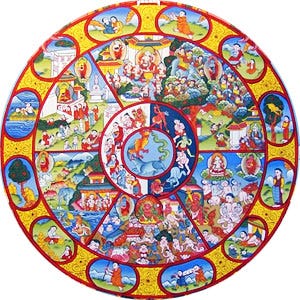Samsara, Karma & How To Escape

Samsara is a Sanskrit word often used to describe the cycles of life, be that the cycle of reincarnation, the cycle of heaven and hell, the cycle of karma resulting in good times and bad times (whether in one life or across reincarnations.) It has been said that a Buddha is one who has escaped Samsara, whom is now no longer affected by karma, no longer trapped within its grasp. In this article I will explain how to get there.
To understand how to escape Samsara we must first understand what it is, truly. Samsara is not what it appears to be, and this is the trick. To escape from a trap you must know the trap, and in knowing how it works it can be undone. A locksmith can pick a lock because they understand how the lock works; a Buddha can escape Samsara because they understand how it works.
I’m going to jump right in the deep end and say it outright: the cycles don’t exist, at least not how you imagine them. It’s an illusion and always has been. There is no Samsara and no karma. That is what the Buddha knows and that is why they are unaffected. One cannot be affected by something that does not exist. What do I mean by this?
Let’s talk about the illusion. The illusion is human-created. It’s not that some god-like entity setup an illusion, or even that the universe has a fundamental nature of being an illusion. The universe is exactly what it claims to be. For you to understand this I must break the illusion. What is the illusion?
The illusion is the illusion of something and nothing. It’s the illusion of background and foreground. All of our beliefs and language are based on the absolute view that there exist things. Light exists and darkness is the absence of light; heat exists and cold is the absence of heat; matter exists and space is the absence of matter. Therefore light and heat exist as things. I don’t usually like to state outright that something is or isn’t true, but in this case I’m going to do it: it’s not true that darkness is the absence of light; it’s not true that cold is the absence of heat. It’s not true that space is the absence of matter; it’s not true that unconsciousness is the absence of consciousness. I’ll explain.
To say that light is a thing, with darkness as an absence of, is like saying that mountains exist and that valleys are just an epiphenomenon of mountains. But the reverse is also true: you cannot have a valley without a mountain, and so it would be equally true to say that a mountain is just the absence of the valley.
Physics says that 0°K (-273°C) is absolute zero, the coldest possible temperature. Don’t let that fool you. Physicists themselves state that you can never reach 0°K. The reason is that temperature is, like light, a cycle, and all cycles have two components: space and time. Heat is measured by iterations (cycles which exist in space) per time period (e.g. second). There is no maximum temperature because you can go on increasing the iterations, e.g. 1 cycle per second, 1000 cycles per second, one million cycles per second, etc. And there is no minimum temperature because you can go on increasing the time period, e.g. 1 cycle per second, 1 cycle per hour, 1 cycle per million years, etc.
Hence to say that the heat is a thing and cold not a thing, or light is a thing and darkness not a thing, is analogous to saying that space is a thing but time isn’t. If you are arranging to meet someone you must agree on both the place and the time! Both are equally important if you actually expect them to show up! In this case, it would be just as valid to say that light is the absence of darkness, and heat the absence of cold.
This is precisely the illusion that causes the description, and therefore illusion of, Samsara and karma. Both Samsara and karma only exist as describable phenomena because it’s the only way for the false-belief-system of absolutism (things existing within nothingness) to describe the true nature of reality. If you start with a false-belief then all true things will look like odd phenomena from your perspective. If you adjust your belief system to be in tune with the true nature of reality then the beliefs of Samsara and karma fall apart. How does this look?
The question to ask is… what is the neutral/natural/beginning state of existence? What is the resting, non-created, non-manipulated state of the universe? If you just created a brand new, shiny, blank universe, what would it look like? If space is just as much a thing as matter, darkness just as much a thing as light, cold just as much a thing as heat, non-existence just as much a thing as existence… then clearly the neutral state of a universe is somewhere in between all of these things. The neutral state is not nothing, and not everything, but something in the middle. Furthermore, if it were all evenly distributed then you’d have fallen for the same trap all over again because even distribution is no more or less a thing or not-a-thing than random distribution. Hence the neutral, non-manipulated, beginning state of the universe is… drumroll please… pockets of different things in different places, some parts evenly distributed, some parts concentrated more than others, some areas with more consciousness, some with less, some areas with more light, some with less. This is exactly what you see around you. Yep, the beginning and the end, the final destination, the being absorbed back into oneness with everything, we are all already here. This IS IT. If the universe were finally complete and we were all returned to our natural state we would be… right here and now.
What of Samsara? What of karma? What of cycles? If you realize that nothing is just as much a thing as something. Then clearly cycles are not things anymore than non-cycles are. A cycle is then not something that can be observed, or something that you could consider yourself in, unless you choose to look at non-cycles as the real thing. That choice to look at the world in that way, which is a false-belief, causes the existence of the illusion of cycles. Which you then try to escape from, but just as if you tried to escape from light, your eyes keep adjusting, and you’re always running but never getting anywhere. Sure, you keep thinking you’re almost there, because whenever you figure out a way to make the room darker, it does work, but give it a little time and your eyes will adjust again and you’ll be right back where you started! This continues forever until you give up.
If you play roulette in a casino, you can bet on black or on red (let’s pretend there’s no house for the sake of the metaphor.) Let’s say you bet on red every time. If you win 10 times in a row you are not more likely to lose the next time, it’s the same as it always was: 50/50. But if you play 1000 games you can expect to have won roughly 50% of the time, regardless of any winning streaks. For every winning streak you get, you’ll probably get a losing streak. At any point in time some people will be losing and some people will be winning. If you go away and come back later, some of the winners will still be winning, and some will now be losing, and some of the losers will now be winning, and some still losing. They just go around and around in this cycle, and there’s no end to it.
If they keep on playing forever then no matter how in debt someone gets, they’ll eventually come back around, and no matter how rich someone gets they’ll eventually lose it all. That’s it. They’re not really doing anything. They’re neither gaining anything, nor losing it. They’re just going around and around. That’s Samsara.
That’s also karma. I expect some people to say “no, you misunderstand, karma is about action and about you reaping what you sow”. This is just a fancy way of saying that you get what it is that you do. Or to put it another way: if you’re winning then you’re winning, and if you’re losing then you’re losing. Which is to say nothing at all. The observation that the more good you put into the world/your-reality then the more good is in the world/your-reality, or that the more water you pour into a glass, the more water is in the glass, is useful only for crazy people who believe if they plant oranges they’re going to get bananas. That’s not exactly information, it’s more like undoing false-belief. It would be a good subject for another article, and I’ve covered it before, but for the sake of escaping from the cycle of karma it’s irrelevant. Those are rules for how to play within karma, based on the false-belief system of absolutism. If you already have a belief system in tune with the true nature of reality then you don’t need to worry about believing that orange seeds will become bananas, because that type of madness you’re already recovered from.
In the metaphor, the gamblers cannot leave the roulette table, just as you cannot leave existence. So you’re always at the roulette table. Sometimes you are winning, and sometimes you are losing. But it literally doesn’t matter because you’re not going anywhere, it all just comes back around whatever happens. There’s nothing to think about and nothing to escape from, you’re not trapped anywhere, you’re just witnessing movement in a relative universe.
But can you leave the table? Can you take your winnings and run? Run where? To another table? To the park? Actually you can. You can take from one area of existence and put that energy into another area of existence. And what of it? The former area will now have less energy, the latter will now have more. It’s like moving a glass of water 4 inches to the left. If you prefer your glass of water on the left then go ahead. But you’ve neither escaped, nor achieved, nor lost, nor become trapped. And because energy only exists in contrast to not-energy, the former area will now have more less-energy, and the latter area will now have less less-energy; so it’s not so much like you took energy, but just exchanged one thing for another equally important thing. All is well in the universe and nothing of note happened.
Trying to escape Samsara is like trying to escape light; your eyes keep on adjusting —but their adjustment is your escape! Whatever happens you’re always in the middle because you always adjust, so you’re literally running from what it is that you want. If you just stop running and look around for a moment then you’ll find that you’re already where you wanted to be. It’s the running that is the problem, and the running is caused by the false-belief.
Nothing has any affect on the greater universe because the greater universe has no absolute form. No form IS what you are currently looking at. It’s all doing something (or parts of it are doing something and parts of it are doing nothing — doing not being anymore of a thing than not-doing), but it’s not doing something as if to get somewhere. Or it is, but where it gets to is fundamentally the same thing as where it was before, and it’ll come back around again sooner or later.
So the final realization is that you already exist at the end-state. Where you are now is the destination. You are already a Buddha and always have been. You were never trapped within the cycles of Samsara or karma, at least not anymore than you are trapped within the cycles of summer and winter. If you don’t like the cold you can light a fire, put on a coat, or move somewhere warmer. What you are not is a victim. What you are not is trapped. But that doesn’t mean just because you’re not trapped that everything now does exactly what you want it to do; that’s a whole different story. Not being trapped doesn’t mean you exist in a world with only happiness and light.
If this doesn’t ring with you, if it’s not fulfilling, then maybe ask yourself… when you imagined yourself escaping, did you really imagine being free… or did you just imagine yourself winning? Being greeted by the other Buddhas, given a medal and escorted off to a better place where there is only light and happiness? That’s not escaping anything, that’s winning the game. If so, then that is your trap. That’s not escaping, that’s just the desire to win roulette. You can get there if it’s what you really want; but my god — the fall will hurt! And in the end, you’ll be right back here where you started. Welcome home!

If you enjoyed this article, you’d like my book “Pan’s Labyrinth”.
Pan’s Labyrinth deftly blends fantasy and philosophy, crafting a thought-provoking narrative that lingers in the mind long after the final page is turned. It invites readers to question the nature of reality and explore the profound ideas woven throughout the story. Engaging and intellectually stimulating, this book promises a reading experience that is both entertaining and deeply meaningful.
